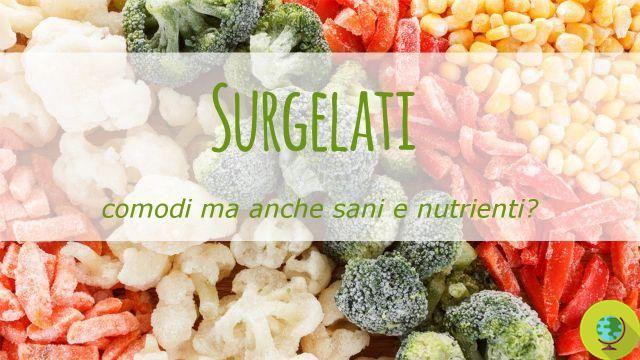
We advise you to use fresh and seasonal foods as much as possible in your diet, but sometimes for special needs you can give in to the temptation of frozen food. But what are the nutritional characteristics of these products?
Don't store avocado like this: it's dangerous
undoubtedly frozen foods are very convenient, especially for those who have to cook something quickly and maybe have not recently done the shopping. But the freezing process does not risk losing nutrients and properties to products?
Obviously we advise you to use it in your diet as much fresh food as possible and seasonal, but sometimes for special needs you can give in to temptation of frozen food better if made as such by yourself starting from the fresh product. In this way, in fact, you will be sure of the origin and genuineness of what you intend to eat.
As we know you can freeze a bit of everything: meat, fish, bread, vegetables and various types of vegetables, legumes, etc. But do all the nutrients contained in the fresh product really remain once frozen?
WHAT HAPPENS TO VITAMINS, MINERAL SALTS, FATS AND PROTEINS?
The freezing process does lose a small part of the nutrients contained in food. For example the vegetables, even if frozen fresh, they tend to disperse a part of the vitamins and mineral salts contained in them, but this is not always true as some studies have shown. Research has shown, for example, that in the case of broccoli and frozen cabbage these had higher levels of riboflavin and antioxidants than the fresh vegetables themselves.
If you then buy those ready in the bags at the supermarket they could also have been subjected to the process of "whitening", That is, before being packaged in order to better maintain the consistency and the color they had been scalded at high temperatures. It is evident that in this way, in particular, the more delicate water-soluble vitamins, such as vitamin C, tend to disperse. If we then add that these vegetables must also be cooked before they can be consumed, what is left of them?
Proteins on the contrary, they do not lose their nutritional properties and indeed, after freezing, as the molecular structure undergoes changes, they seem to become more digestible.
The fats instead (we are especially interested in the good ones such as the Omega 3) instead undergo changes that compromise their quality. It is therefore better not to buy frozen fish or freeze ourselves fish such as salmon, rich in essential fatty acids which in this way would be at least partially lost or deteriorated.
RESPECT FOR THE COLD CHAIN
To ensure that frozen foods do not lose their properties or, even worse, they can become potentially dangerous, it is important to respect the cold chain. This means when you buy already frozen products must be placed in the freezer as soon as possible avoiding that the thawing process begins, which can lead to the appearance and spread of pathogenic bacteria.
For the same reason you do not have to defrost a food and then refreeze it, even in this case there is a risk of bacterial poisoning. The situation in which a food is defrosted is different, it is cooked and then refrozen. In this case, refreezing is allowed as the intermediate cooking makes everything not dangerous.
Also important to know how to defrost properly, in this regard, listen to the video ...
Read also:
10 tips and tricks for freezing fruit and vegetables
All the tricks for freezing fruit, vegetables and herbs
Freezer: how and when to defrost the freezer


























